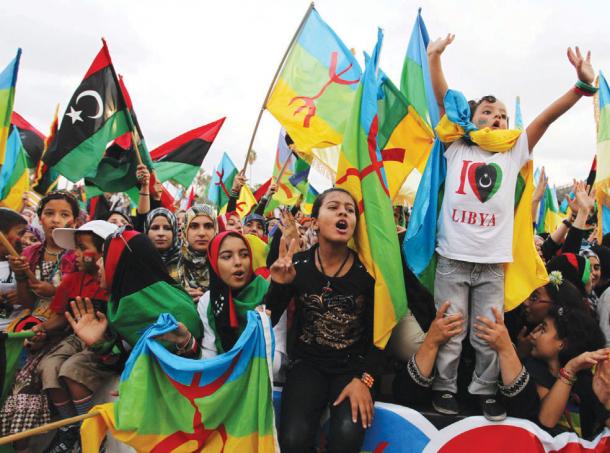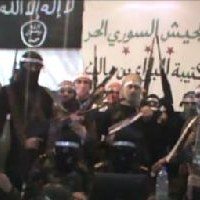![]()
Sat, April 28, 2012 | Middle East Forum | by Aymenn Jawad Al-Tamimi
First published in PJ Media.
One reason the term “Arab Spring” is a misnomer is because of the participation of non-Arabs, including Kurds in Iraq and Syria as well as Berbers in Morocco and Libya. While both of these non-Arab groups are Muslims, they tend to oppose Islamism both because they see it as tantamount to Arabization and because their observance of religion is often more flexible due to their own customs and history.
Berbers, who often prefer to call themselves Amazigh, constitute between 5% and 10% of Libya’s population. But they are more important politically than those numbers imply. They are highly concentrated in the country’s northwest, and provided a relatively important proportion of the fighters in the war that overthrew the regime of Muammar Gaddafi.
Six months since the revolt succeeded, the Berbers are largely disappointed with the result. Despite playing a key role in fighting in the western Nafusa Mountains during the Libyan civil war, no ministerial posts in the interim government were allocated to Berbers. This provoked protests from Berber activists that were simply ignored by the National Transitional Council (NTC).
It is also clear that significant tensions exist with neighboring Arab tribes in Libya’s northwest. Earlier this month, heavy fighting emerged between Berber militiamen from the coastal town of Zuwarah and Arab militiamen from the nearby town of Ragdalein.
The latter was traditionally supportive of Gaddafi’s regime, and apparently provoked the clashes with the capture of 34 men from Zuwarah’s local militia in response to “abuses.” The abuses likely entailed reprisal attacks against Ragdalein on account of its long-standing pro-Gaddafi stance. Dozens were killed in the fighting that followed, and a truce declared by NTC authorities did not even last 12 hours.
That said, it would be wrong to think there have been no positive changes in Libya for the Berbers. Back in November 2011, for example, the predominantly Berber town of Kabaw saw unhindered celebrations of Berber culture, with many expressing delight at the free opportunity to speak Tamazight and to fly the Amazigh flag.
Indeed, as the first article of the interim constitution states:
The State shall guarantee the cultural rights for all components of the Libyan society and its languages shall be deemed national ones.
While some Amazigh activists appear to be keen to portray Berbers as more liberal and anti-Islamist than their Libyan Arab counterparts (a picture eagerly promoted in a Wall Street Journal op-ed), it is far from certain that this portrait corresponds to reality. One report in The Atlantic in December last year illustrated a case-in-point:
Miloud is convinced that there is something distinctly feminist in Amazigh culture … but admits that her experience has not always lived up to her vision of Amazigh equality. When she approached the local council to ask for funding for the center to teach women basic working skills and literacy, she says they dismissed her offhand.
It follows from all this that there is nothing to suggest that Berbers are likely to be targeted collectively by Islamists, although there is the ongoing risk of further clashes with Arab militias.
One of the key problems facing Amazigh activists in the country is that the community as a whole does not have a unified and coherent conception of its own identity. As Ayoub Sufyan puts it: “We don’t know who we are. Am I a Libyan or Amazigh or Muslim?”
The situation is analogous to Christians in the Middle East, where one finds a range of conflicting conceptions of identity from Arabism (common among Melkites and Antiochian Greek Orthodox) to Aramaean nationalism (e.g., the Syriac Orthodox) to Assyrian nationalism (mainly the Assyrian Church of the East). This has partly been responsible for preventing the formation of a viable Christian polity in the region.
Interestingly, some Berber activists are keen to launch an effort to convince the rest of the Libyan population that they are in fact all Berbers.
Ultimately, this enterprise is unlikely to gain much ground. While it is true that Berbers inhabited North Africa prior to the Arab conquests, and that strictly speaking the Libyan Arabs are mostly just an Arabized population, the fact is that Arabization (especially in tandem with Islamization) has become a key foundation of Arab identity. In Egypt, an Arabist conception of identity has prevailed among the Muslim population over the Pharaonism promoted by the liberal intellectual Taha Husayn.
In any case, how far back in history would these Berber activists like to go, if the argument focuses on genetics? After all, North Africa has seen a degree of mixing of ethnic groups, including the East Germanic tribe known as the Vandals, who established a kingdom around Carthage in the Fifth Century as the Western Roman Empire declined.
To round off, it is worth noting the recent announcement by the NTC banning parties based on religion, tribe, and ethnicity. This prohibition is unlikely to apply to the Muslim Brotherhood and other Islamist parties at least on the ground level given the NTC’s dalliances with Islamism, but it will almost certainly apply to any parties claiming to stand for Berber interests, since the Amazigh have already been excluded from interim ministerial posts.
In short, this confirms that the emerging picture appears to be one of political rather than cultural marginalization for Libya’s Berbers.
Aymenn Jawad Al-Tamimi is a student at Brasenose College, Oxford University, and an adjunct fellow at the Middle East Forum.



 RSS
RSS











[…] and liberal Berbers and an Islamist-inclined Arab population. Later, however, I realized that such a picture was not quite accurate, and is often the result of an impression given by Berber activists who address Western […]